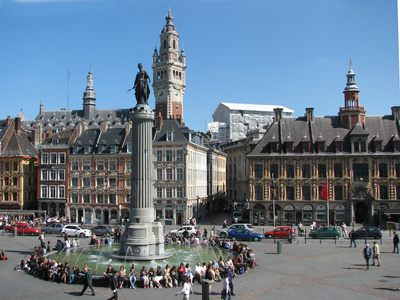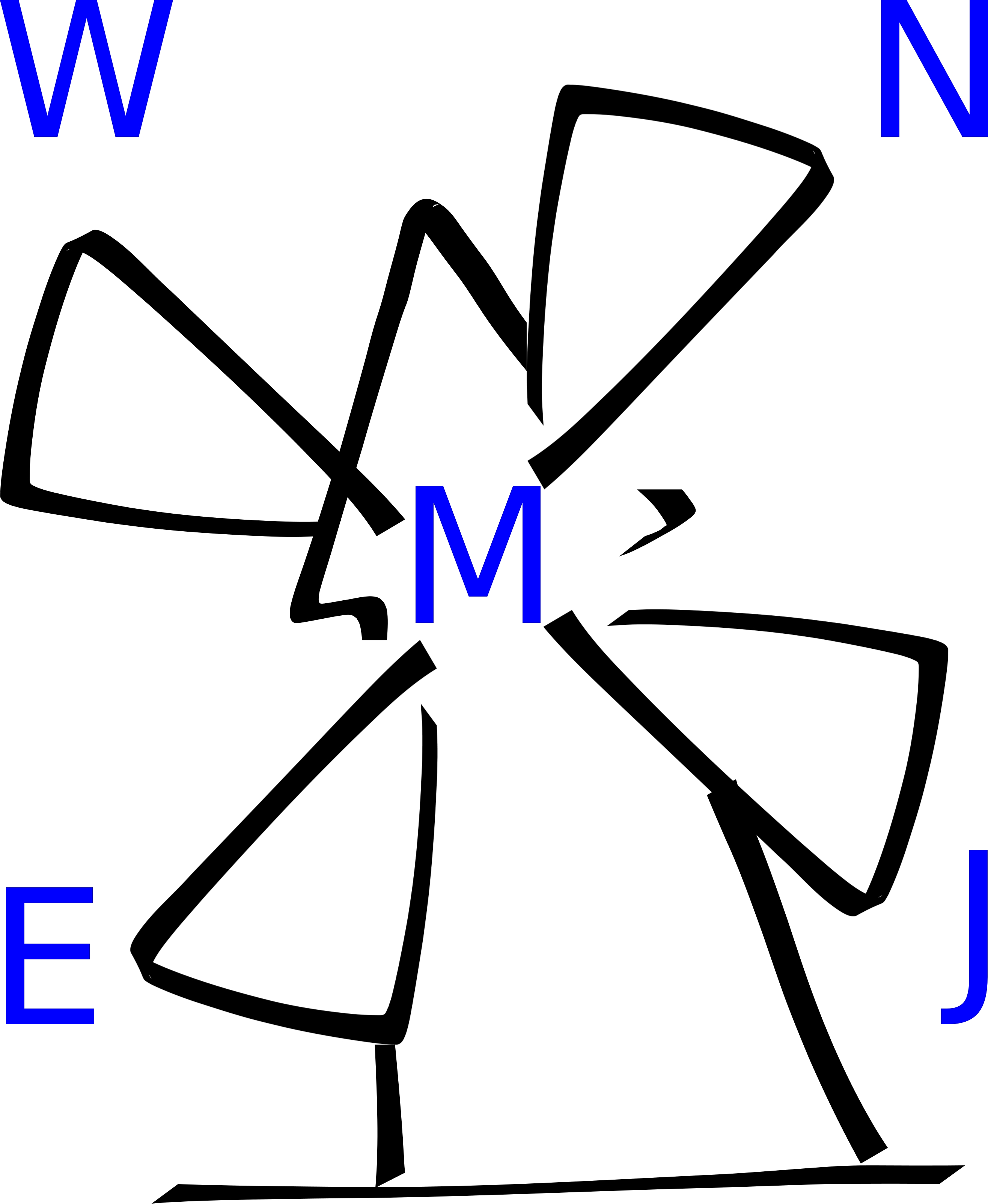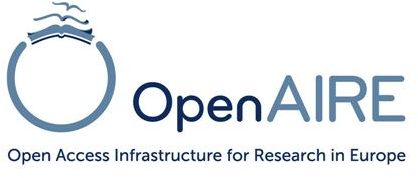
The Lille Main Square
Aims and scope
The North-Western European Journal of Mathematics publishes research articles and surveys in all areas of pure and applied mathematics including history of mathematics. Articles can be submitted in Dutch, English, French or German.
Editorial Committee
Editor in Chief: Olivier Goubet
Associate Editors:
Universität der Bundeswehr München, Germany Numerical analysis for partial differential equations Karine Beauchard (*)
ENS Rennes, France Joachim von Below (*)
Université du Littoral Côte d'Opale, France Partial differential equations, operator theory, graph theory Christophe Biernacki (*)
Université de Lille, France Statistical, model-based data analysis Claire Chainais-Hillairet (*)
Université de Lille, France Numerical analysis for partial differential equations Monique Dauge (*)
Rennes I, France Spectral theory, high order methods, singularities in partial differential equations Sinnou David (*)
Université Paris VI, France Arithmetic Youri Davydov (*)
Université de Lille, France Stochastic processes, limit theorems, stochastic geometry Pierre Dèbes (*)
Université de Lille, France Number theory, galois theory and arithmetic geometry Jérôme Droniou (*)
Monash University, Australia Elliptic and parabolic equations (theoretical and numerical study) Aziz El Kacimi (*)
Université de Valenciennes et du Hainaut Cambrésis, France Geometry, global analysis on manifolds Shalom Eliahou (*)
Université du Littoral Côte d'Opale, France Discrete mathematics Peter Fleischmann (*)
University of Kent, United Kingdom Algebra, group theory, representation theory, invariant theory Benoît Fresse (*)
Université de Lille, France Algebraic topology, operad theory Eamonn Gaffney (*)
Oxford University, United Kingdom Applied mathematics in the life sciences and low Reynolds flows Antoine Gloria (*)
Université Sorbonne, France Homogenization of partial differential equations Gilles Godefroy (*)
Université Paris VI, France Functional analysis Karl Grosse-Erdmann (*)
Université de Mons, Belgium Functional analysis, operator theory, linear dynamics Sophie Grivaux (*)
Université de Lille, France Functional analysis, dynamical systems Bao-Zhu Guo (*)
Academy of Mathematics and Systems Science, Academia Sinica, Beijing, China System control, partial differential equation, semigroup of linear operators Philippe Heinrich (*)
Université de Lille, France Probability, stochastic processes Pascal Lefèvre (*)
Université d'Artois, France Functional analysis
Université d'Artois, France Non commutative ring theory, module theory, error correcting codes Jean-Jacques Loeb (*)
Université d'Angers, France Complex analysis, in particular when related to group theory Florian Luca (*)
University of Witwatersrand, Johannesburg, South-Africa Analytic and diophantine number theory Kaisa Matomäki (*)
University of Turku, Finland Analytic and combinatorial number theory Christian Michaux (*)
Université de Mons, Belgium Mathematical logic Ieke Moerdijk (*)
University of Utrecht, Netherlands Algebraic topology, category theory Alejandro Murua (*)
Université de Montréal, Canada Statistical learning, clustering, pattern recognition Hiroaki Nakamura (*)
Osaka University, Japan Arithmetic geometry Jan van Neerven (*)
Delft University of Technology, Netherlands Functional analysis, stochastic analysis Johannes Nicaise (*)
Katholieke Universiteit Leuven, Belgium Algebraic and arithmetic geometry Serge Nicaise (*)
Université Polytechnique Hauts-de-France, France Partial differential equations, numerical analysis, control theory Rimas Norvaisa (*)
Vilnius University, Lituany Probability theory and stochastic processes, non-linear functional analysis Giovanni Peccati (*)
University of Luxembourg, Luxembourg Random fields, stochastic analysis, stochastic geometry, non-commutative probability Andrey Pilipenko (*)
Institute of Mathematics of Ukrainian National Academy of Sciences, Ukraine Stochastic differential equations, stochastic flows, Functional limit theorems for perturbed random walks Teimuraz Pirashvili (*)
University of Leicester, United Kingdom Homological algebra and polynomial functors Olivier Ramaré (*)
Université d'Aix-Marseille, France Analytic number theory Mark Spivakovsky (*)
Université Paul Sabatier, Toulouse, France Algebraic geometry, algebra Isar Stubbe (*)
Université du Littoral Côte d'Opale, France Category theory, order theory Charles Suquet (*)
Université de Lille, France Probability in functional spaces and applications Rossana Tazzioli (*)
Université de Lille, France History of mathematics Nicolas Wicker (*)
Université de Lille, France Applied mathematics Jie Wu (*)
Institut Élie Cartan, Nancy, France Analytic number theory and modular forms
Fields Editor: Deirdre Haskell Managing Editor: Philippe Heinrich
Policies
Peer Review Process
The reviewing process is simple anonymous, that is the reviewers are kept anonymous while the authors are not. The authors are asked to provide the names of one or two potential associate editors who will manage their article. Then, the editor in chief assigns the article to an associate editor who seeks reviewer(s). Once the reviews are available, the associate editor reports his decision to the whole editorial board which takes the final decision regarding the acceptance of the article.
Open Access Policy
The North-Western European Journal of Mathematics adheres to the principles of Fair Open Access, and is a member of the Free Journal Network. No charges are levied on authors. Articles are freely available to anyone as soon they are accepted. Hard copies of a volume are available at the cost of the paper and delivery.
Copyright Notice
Authors keep their copyrights. Thus they can reuse figures, article parts or any material they need for subsequent work. The contract license is the Creative Commons License CC-BY which is the most flexible contract maximising the readership on publication.
Author Guidelines
Articles submission:
- At the initial stage, the authors have only to send by mail a PDF file to the managing editor (philippe.heinrichNOSPAMATuniv-lille.fr).
- Only when the article is accepted or subject to minor revisions are they asked to ensure it complies with the journal format. Here you can find an example of a LaTeX and a biblatex file. The template and the documentation in French and also in English.
- After acceptance, the '.tex', '.bib' and '.pdf' files in the journal format should be sent by mail to the managing editor as well (philippe.heinrichNOSPAMATuniv-lille.fr).
LaTeX details:
- LaTeX class: We strongly encourage the authors to prepare their article to appear in the NWEJM journal with the dedicated `nwejmart' LaTeX class, available with up to date MiKTeX and TeX Live distributions.
- Incompatibilities:
- Our production system is not compatible with the `xypic' bundle. For commutative diagramms, please use instead the user-friendly and modern `tikz-cd' package.
- We much more prefer graphics not created with `PSTricks' and derived. Consider using `PGF'/`TikZ' or derived packages. In case you really need one of these packages, please contact us.
- Bibliography: The bibliography must be provided as a `.bib' file in the format of the `biblatex' package.
- Figures: The figures must be provided in PDF or EPS formats.
Current Volume:
The current volume is the volume of 2024.
-
We provide in this paper the hamiltonian delay equations of motion for the newtonian n-body problem deduced from the quantum calculus of variations developed in Cresson 2005; Cresson, Frederico, and Torres 2009; Ryckelynck and Smoch 2013, 2014. These equations are brought into the usual lagrangian and hamiltonian formulations of the dynamics and yield sampled functional equations involving generalized derivatives. We investigate especially homographic solutions to these equations that we obtain by solving algebraic systems of equations similar to the classical ones. When the potential forces are homogeneous, homographic solutions to the delayed and to the classical equations may be related through an explicit expansion factor that we provide. Consequently, perturbative equations both in lagrangian and hamiltonian formalisms are deduced.
-
Ebert's hat problem with two colors and equal probabilities has, remarkable, the same optimal winning probability for three and four players. This paper studies Ebert's hat problem for three and four players, where the probabilities of the two colors may be different for each player. Our goal is to maximize the probability of winning the game and to describe winning strategies. We obtain different results for games with three and four players. We use the concept of an adequate set. The construction of adequate sets is independent of underlying probabilities and we can use this fact in the analysis of our general case. The computational complexity of the adequate set method is dramatically lower than by standard methods.
Acknowledgements
This journal owes much to the following persons: Denis Bitouzé for LaTex support, Nadine Demarelle for printing service, Mohammed Khabzaoui for computer engineering issues and Omar Aouadi for secretarial tasks.
Supports
The Paul Painlevé Laboratory and the Department of Mathematics of Lille provide financial support which ensures that this journal stays open access. The French Mathematical Society (SMF), the Dutch Mathematical Society (KWG), the Luxembourg Mathematical Society (SML) and the Fields Institute support this project, of a mathematics journal by a non-profit publisher, making research available free of charge for readers and authors.


